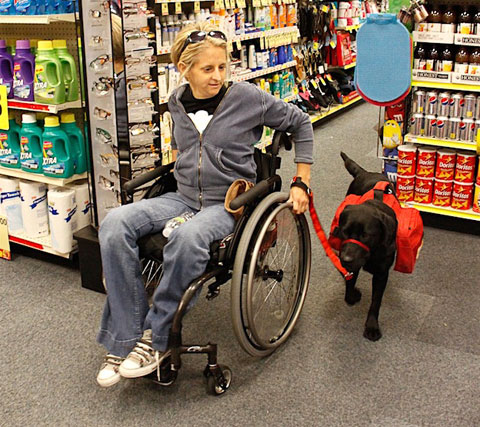
Vol. XVI, No. 1, January 2016
- Editor's corner
- Hedonic adaption - the curse of family entertainment centers
- Sometimes you just need to have a whole lot of patience
- Birthday University scholarship
- Time is the new luxury - a new competitive strategy
- The rise of tech-kids
- Corporate social responsibility - Its growing importance
- The scoop on service dogs; the law and your rights
The scoop on service dogs; the law and your rights

When it comes to the treatment of people with service dogs in a business, you need to know both their and your legal rights. Most people are under the false impression that only seeing-eye dogs for the vision impaired or the blind qualify as service dogs. There are service dogs for many other types of conditions, most not obvious when looking at the person the service dog is caring for. There are service dogs for the hearing impaired and deaf; for medical conditions such as diabetes, epilepsy and food allergies; for mobility support such as pulling a wheelchair; for psychiatric conditions and for many other special needs.
So what can you ask a person who comes into your business with a service dog? There are only two permitted questions under the Federal ADA law:
- Is this a service dog?
- What task does this animal provide for you?
That's it! If the person says it's their service dog, the courts have been very clear; you have to take their word for it. Requesting some type of ID or other proof is illegal. You can't ask for the dog to demonstrate the task it provides. You cannot ask about the person's disability. That is private information and considered harassment of the disabled. It's very clear under the law that any further type inquiry other than those two above questions is illegal.
Any business that serves the public must allow people with disabilities to bring their service animals into all areas of the facility where customers are normally allowed to go. Businesses that sell or prepare food such as a restaurant must allow service animals even if state or local health codes prohibit animals on the premises. Federal law takes precedence over any state or local laws or regulations. Allergies and fear of animals are generally not valid reasons for denying access or refusing service to people with service animals.
People with disabilities who use service animals cannot be charged extra fees, isolated from other patrons, or treated less favorably than other patrons.
A person with a disability cannot be asked to remove his service animal from the premises unless: (1) the animal is out of control and the animal's owner does not take effective action to control it (for example, a dog that has inappropriately barking) or (2) the animal poses a direct threat to the health or safety of others.
In these cases, the business should give the person with the disability the option to obtain goods and services without having the animal on the premises.
You are not required to provide care or food for a service animal or provide a special location for it to relieve itself.
Leslie Horton, R.N. a service dog trainer for Most Fine Canine, Inc., says, “Please remember to treat a service dog as a piece of medical equipment. You would not hiss at, bark, whistle at, or try to feed or pet a crutch or wheelchair. All that is required of any restaurant is to ignore the dog and seat and serve the patron. Most service dogs have been taught to go under the table and lie down, and to stay out of the way.”
Violators of ADA requirements for the treatment of people with service dogs can be required to pay substantial money damages and penalties. Furthermore, it will only give the business a bad reputation. Appropriate and legal treatment of customers with service dogs is just good business as it will guarantee repeat business and positive word-of-mouth.
Vol. XVI, No. 1, January 2016
- Editor's corner
- Hedonic adaption - the curse of family entertainment centers
- Sometimes you just need to have a whole lot of patience
- Birthday University scholarship
- Time is the new luxury - a new competitive strategy
- The rise of tech-kids
- Corporate social responsibility - Its growing importance
- The scoop on service dogs; the law and your rights


